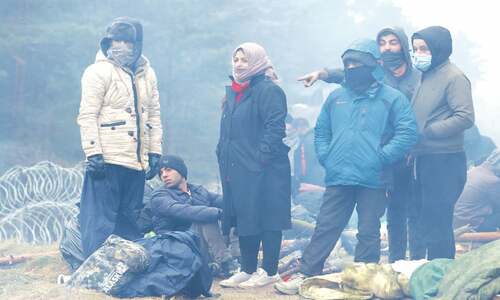WASHINGTON: The United States denounced Russia on Monday for conducting a “dangerous and irresponsible” missile strike that blew up one of its own satellites, creating a debris cloud that forced the International Space Station’s crew to take evasive action.
Washington wasn’t informed in advance about the test, only the fourth ever to hit a spacecraft from the ground, and will talk to allies about how to respond, said officials.
The move reignites concerns about the growing space arms race, encompassing everything from the development of satellites capable of shunting others out of orbit to laser weapons.
“On November 15, 2021, the Russian Federation recklessly conducted a destructive test of a direct-ascent anti-satellite missile against one of its own satellites,” said Secretary of State Anthony Blinken in a statement.
He added the test had generated over 1,500 pieces of trackable orbital debris and will likely create hundreds of thousands of pieces of smaller orbital debris.
The crew aboard the orbital outpost — currently four Americans, a German and two Russians — had to take shelter in their return ships, the standard “safe haven” alarm procedure in the event of an emergency that might force evacuation.
The station later returned to a “green” alert level, tweeted Russian space agency Roscosmos. But in his strongly-worded remarks, Blinken said the danger was far from over.
“The long-lived debris created by this dangerous and irresponsible test will now threaten satellites and other space objects that are vital to all nations’ security, economic, and scientific interests for decades to come,” he said.
“Russia, despite its claims of opposing the weaponization of outer space, is willing to jeopardize the long-term sustainability of outer space and imperil the exploration and use of outer space.” The United States was discussing its response with partners, Blinken added. In a Pentagon briefing, spokesman John Kirby told reporters the US didn’t receive advanced notice, and was closely watching Russian defense capabilities.
The target of the missile was Cosmos 1408, a 1982 Soviet signals intelligence satellite that has been defunct for several decades, according to space industry analysis company Seradata.
Anti-satellite weapons (ASATs) are high-tech missiles possessed by few nations.
India was the last to carry out a test on a target in 2019, creating hundreds of pieces of “space junk” strongly criticised by other powers, including the United States.
The United States shot down a satellite in 2008 in response to China demonstrating a similar knockout in 2007.Nato Secretary General Jens Stoltenberg on Tuesday slammed as “reckless” Russia’s destruction of a satellite that created a debris cloud he said was dangerous to orbiting space stations.
“This has created a lot of debris, which is now a risk to the International Space Station and also to the Chinese space station — so this was a reckless act by Russia,” Stoltenberg told journalists.
Russia’s defence ministry acknowledged destroying one of its satellites during a missile test to bolster its defence capabilities, but denied the move was dangerous. Stoltenberg said it was a concern as it showed Moscow was working on weapons capable of striking critical infrastructure.
“It demonstrates that Russia is now developing new weapon systems that can shoot down satellites, can destroy important space capabilities for basic infrastructure on Earth like communications, like navigation, or like early warning of missile launches,” he said.
France on Tuesday lashed out at “space vandals” who were producing dangerous amounts of debris after Russia admitted to destroying one of its satellites during a missile test.
Published in Dawn, November 17th, 2021














































